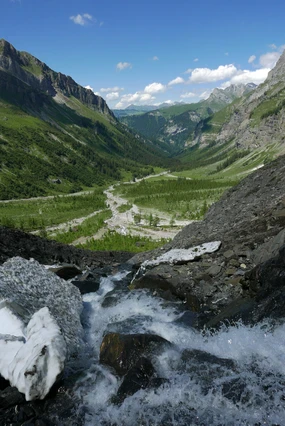Subdivision on Catchment hydrology
Chairs: Björn Guse and Miriam Glendell

Under ever growing human pressure on natural resources, key tasks of hydrology include the observation of dominant hydrological processes (partitioning of incoming precipitation, storage and release of water and transport of substances), predictions about their temporal occurrence and about spatial patterns, understanding the scaling effects or process feedbacks and ecosystem evolution. The central landscape unit for these analyses is the catchment that filters incoming precipitation and transforms it into the hydrological response. From a water resources management point of view, the catchment is the natural unit for decision making and for natural hazard assessment (e.g. water pollution, shallow landslides, floods and droughts).
Scientific sessions organized by the subdivision on catchment hydrology thus bring together specialists in all fields of hydrology but with a special focus on process understanding and model development at the catchment scale.
Topics of interest include:
- New monitoring strategies and innovative sensing techniques relevant for process understanding at the catchment scale and quantification of associated uncertainties
- New tracers or novel application of existing tracing techniques
- Hydrological model development at the catchment scale, including model identification and diagnostics
- Observation and prediction of hydrological change
- Water quality, micropollutant and pathogens observation and modeling at the catchment scale
- Understanding and modelling of the occurrence of hydrological extremes (floods and droughts), their role in the catchment response and drivers of change (excluding, however, real-time forecasting covered by the Subdivision on Forecasting)
- Analysis of hydrological processes and patterns relevant for the catchment scale: hydrological storage behavior, mixing processes, hillslope runoff generation, flow pathways, and transit times through hydrological systems.
- Water resources quantification in different climate and world regions (including e.g. arid regions, mountain hydrology)
Given the scope of all other subdivisions, a session on large scale hydrology is traditionally also hosted by the Catchment Hydrology SD. Special sessions pertaining to the above topics with pronounced cross-disciplinarity might also be run in selected years in the General Hydrology SD.
